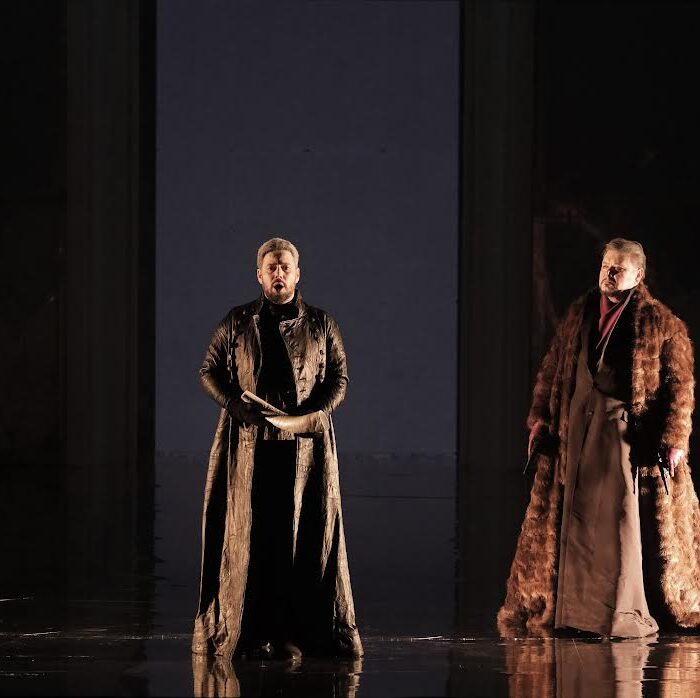
Festival d’Aix-en-Provence 2024 Review: La Clemenza di Tito
Marianne Crebassa Shines In ‘Explosive’ Take on Mozart Gem
By João Marcos Copertino(Credit: Vincent Beaume)
We are in the middle of Sesto’s aria “Parto, Parto,” mezzo-soprano Marianne Crebassa sharing center stage with excellent clarinetist Nicola Boud, when we hear an explosion. As a long-time resident of the United States, my first thoughts were the most dreadful—gunshots, bomb, the apocalypse.
Raphäel Pichon peacefully kept conducting, with longer pauses, perhaps, but, as the fear dissipated, the talent of the musicians on the stage became evident. Even in the most in extremis circumstances, the maintained their concentration. The explosion—quite likely a light bulb—, was never officially explained. The musical success… Here am I!
All Over the Place
“La Clemenza,” though a charming opera, certainly falls short next to its sisters (“Don Giovanni,” “Così,” and certainly “Die Zauberflöte”). Therefore, its cast has a double task: to make the opera work and to be as interesting as Mozart can be. Casting-wise, the night seemed to walk that way: at least half of the most coveted French mezzos were on the stage (Crebassa, Deshayes, and Desandre). Still, opera only works live—and in person—not on paper.
The performance was certainly a smash hit with the audience—few times has a show been so applauded—, but, in my humble opinion, there were great moments and some mishaps. The interesting phenomenon is that often what was imprecise or unexacting here, became the essence of a great success there.
One example is Pichon’s tempi: they were intentionally imprecise or too slow in the recitative, giving the performance a certain aura of solemnity that detracted much from the power of the drama. However, few things were more engaging than the very same tempi in the arias. The breaks in fermata were really taken seriously by him, with long and anguishing pauses that made our concentration splash into the music and the action.
Again, on Pichon and the Pygmalion. From the prelude, one could tell that his orchestra was, perhaps, a bit too quiet for Mozart. Nevertheless, it was precisely such a less flamboyant sonority that allowed many of the singers to sound so bravely in their arias and to pinpoint some beautiful orchestral solos.
Il Talento di…
The opera is called “La Clemenza di Tito,” but it could have been “Il talento di Crebassa.” Despite the excellent quality of the cast, her vocal preeminence was palpable. Her tone, puerile and boyish, allowed her an expressiveness that made Sesto the most important hero. Few mezzos can sing trouser repertoire so well as she does. Her voice always sounds extremely healthy and focused, with rich lower notes when they are necessary. Crebassa’s Sesto is almost a call for intellectual redemption—how could one not feel pity for him?
Karine Deshayes, on the other hand, sang a Vitellia full of acidity and ferocity. I have always enjoyed Deshayes’s voice tremendously, but I have never seen her singing a role with so much brutality. Her coloraturas—a bit less comfortable than usual—sounded like punches of anger. It was a very antipathic character—whichi, for Vitellia, is not a problem.
The story was a bit different with Pene Pati. On a personal note, I often think he has the most beautiful tenor voice for Italian repertoire nowadays—his Rodolfo is impeccable, and even in Bellini, he shone—; however, his Mozart is not spotless. He suffered a bit with the slow tempi in the recitatives. In the most lyric aria of the role (“Deh più sublime soglio”), everything went smoothly, especially in the second half, with charming pianos. But “Se all’impero” was bit messy; the ornamentation compromised the quality of the high notes in the end of any longer melisma.
In her usual charming fashion, Lea Desandre sang a vividly charming Annio. Her approach to a trouser role is interesting; her voice sounds brighter, quicker, and somehow, more compelling.
Nahuel di Pierro was a solid Publio, and Emily Pogorelc showed a very beautiful voice singing the role of Servilia.
Perhaps this season at Aix needed a bit more Mozart. The composer, always present in the festival, had little space this time. However, Pichon’s concert version of “Clemenza” was certainly a memorable night, be it because of Crebassa’s spectacular performance, the freshness of the cast, the technical difficulties that did not stop the show or, even, the fact that it happened on the day that Biden chose to drop out of the US presidential race. Regardless of what happened, it was a memorable night for opera.


